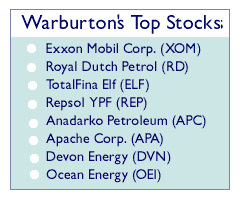NEW YORK (CNNfn) - Skyrocketing oil prices led to OPEC's agreement Wednesday to raise oil output by 708,000 barrels per day, a 3 percent increase. But will it be enough to halt spiking prices and what stance should investors take when looking at oil and energy companies?
CNNfn.com asked UBS Warburg's oil analyst, Matthew Warburton, what his thoughts were for the oil sector, what impact OPEC - or the Organization of Petroleum Exporting Countries -- has on investment decisions, and whether or not investors should put money into the oil arena.
CNNfn: What do you think about current oil prices? Where do you see them going?
Warburton: We believe current oil prices are unsustainably high given the risks to economic recovery in Asia and longer-term inter-fuel competition and expected non-OPEC supply responses. OPEC will look to manage prices down to a more acceptable range of $20-to-25 per barrel, which should also help to diffuse the political pressure surrounding U.S. gasoline. Following OPEC's recent quota announcement, we expect oil prices to retreat $2-to-3 per barrel in the coming months as supply and demand fundamentals reassert themselves.
 Later in 2000, assuming a further increase in OPEC production in the third or fourth quarter, we believe OPEC-10 production will be at too high a level for the demand profile we forecast into 2001 and that this will help to rebuild inventories and ultimately lower prices. In the medium term, OPEC's desire to monetize its long-life reserves and the continuing secular decline in upstream costs will, we believe, bring prices back down to our $18.50 per barrel equilibrium price in 2003. Our price profile for WTI [West Texas Intermediate] is $28 per barrel in 2000, $23 in 2001, $19.50 in 2002 and $18.50 thereafter. Later in 2000, assuming a further increase in OPEC production in the third or fourth quarter, we believe OPEC-10 production will be at too high a level for the demand profile we forecast into 2001 and that this will help to rebuild inventories and ultimately lower prices. In the medium term, OPEC's desire to monetize its long-life reserves and the continuing secular decline in upstream costs will, we believe, bring prices back down to our $18.50 per barrel equilibrium price in 2003. Our price profile for WTI [West Texas Intermediate] is $28 per barrel in 2000, $23 in 2001, $19.50 in 2002 and $18.50 thereafter.
CNNfn: How should investors adjust their portfolios in light of the OPEC meeting?
Warburton: If we see a sustained rally in integrated oil stocks in the coming weeks, we would selectively take profits and reduce holdings. We would also look to position our holdings to those names with slightly higher refining and marketing exposure, such as Exxon Mobil, to coincide with our view of future oil price direction.
CNNfn: What do you think about OPEC's strategy regarding production?
Warburton: OPEC's recent quota increase of 708,000 barrels per day was in line with our expectations but below other market analysts' views. We understand OPEC's concern not to repeat past mistakes by increasing production and also its concern about demand declines going into 2001, but more oil will be required by the fourth quarter of 2000 to support the seasonal upturn in demand.
 CNNfn: What advice can you give investors regarding oil stocks? CNNfn: What advice can you give investors regarding oil stocks?
Warburton: We would adopt a neutral stance toward the large U.S. integrated names. With oil prices at current levels, we believe 2000 is as good as it gets in terms of financial performance. Although the stocks look like a reasonable value on 2000 multiples, when we look out 2-to-3 years the sector looks like fair value with little further upside. In the energy and petroleum and service sectors we see further upside based on the strong U.S. natural gas story and continuing recovery in capital programs.
CNNfn: What do you expect on the earnings front for oil firms?
Warburton: 2000 will be a bumper year for the industry. We forecast the U.S. integrated oil companies will deliver a 110 percent earnings-per-share uplift over 1999. Thereafter, given our oil price expectations, we expect earnings to decline by 6 percent in 2001 and 5 percent in 2002.
CNNfn: How will OPEC's decision affect the economy?
Warburton: U.S. economic sensitivity to increasing crude prices has been dramatically reduced compared to previous oil price shocks due to greater energy efficiency and the increasing service element within the economy. High gasoline prices will also impact personal disposable income somewhat but not to the degree that the headlines suggest. Having said all that, our economists are increasingly concerned about the impact of higher oil prices on the wider input cost issue within the U.S. economy and how that feeds through into inflation and consequently impacts the Fed's decision on interest rates.
--Compiled by Staff Writer Catherine Tymkiw
* Disclaimer 
|

